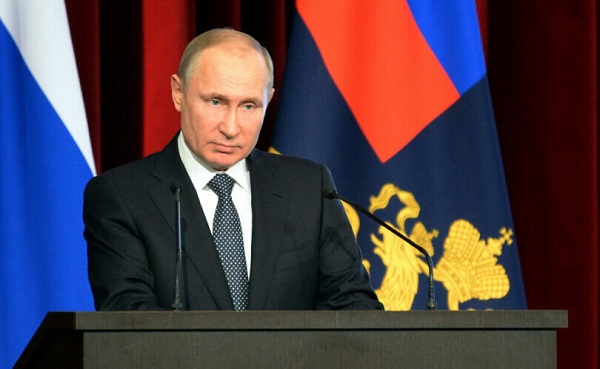Uncategorized
UK lawmakers prepare to deliver verdict on EU divorce deal

LONDON — British lawmakers were preparing to deliver their verdict on Prime Minister Theresa May’s divorce deal with the European Union on Tuesday after more than two years of political upheaval.
All signs point to it receiving a resounding thumbs-down from Parliament, a development that would throw British politics further into turmoil, just 10 weeks before Britain is due to leave the EU on March 29.
Despite a last-ditch plea from May for legislators to give the deal “a second look,” it faces deep opposition from both sides of Britain’s divide over Europe. Pro-Brexit lawmakers say the deal will leave Britain bound indefinitely to EU rules, while pro-EU politicians
That leaves the agreement facing likely defeat on a day that could bring a very British mix of high drama, low insults and convoluted parliamentary procedure. The government and opposition parties ordered lawmakers to cancel all other plans to be on hand for the crucial vote. One Labour legislator, Tulip Siddiq, delayed the scheduled cesarean birth of her son so she could attend.
Environment Secretary Michael Gove urged colleagues not to let their visions of a perfect Brexit get in the way of what he said was a good deal.
“The real danger is if people do not vote for the government this evening, we face either a no-deal Brexit, with the short-term economic damage that would bring, or worse: no Brexit at all,” Gove told the BBC.
Lawmakers are scheduled to vote Tuesday evening, after the last of five days of debate on the deal struck between May’s government and the EU in November. May postponed a vote on the deal in December to avoid a resounding defeat, and there are few signs sentiment has changed significantly since then.
In the last few weeks May has sought new reassurances on the deal’s most contentious section, an insurance policy known as the “backstop” designed to prevent the reintroduction of border controls between the U.K.’s Northern Ireland and EU member Ireland.
But assurances from EU leaders that the backstop is intended as a temporary measure of last resort have failed to win over many skeptics, and the EU is adamant that it will not renegotiate the 585-page withdrawal agreement.
In a sign of the widespread opposition, Parliament’s unelected upper chamber, the House of Lords, voted by 321 to 152 late Monday in
The Lords’ vote has no direct effect on the fate of May’s deal.
May says rejecting the agreement would lead either to a reversal of Brexit — overturning voters’ decision in a 2016 referendum — or to Britain leaving the bloc without a deal. Economists warn that an abrupt break from the EU could batter the British economy and bring chaotic scenes at borders, ports and airports.
Former education minister Nicky Morgan, who said she planned to vote for May’s agreement, warned that the U.K. wasn’t ready for the economic upheaval of a no-deal Brexit.
“There are millions of people in this country watching Westminster and Parliament very anxiously today,” she told the BBC.
If Parliament votes down the deal, May has until Monday to come up with a new proposal. So far, May has refused publicly to speculate on a possible “Plan B.”
Some Conservatives expect her to seek further talks with EU leaders on changes before bringing a tweaked version of the bill back to Parliament.
Germany’s foreign minister played down the possibility of May getting a better deal.
Heiko Maas told reporters in Strasbourg that while there would probably be new talks with the EU, he doesn’t believe that “completely new solutions” will be offered “that are not related to what has been negotiated and decided on so far.”
German news agency dpa reported Maas said that he’s “skeptical that the entire agreement can be re-opened.”
May’s position will be precarious if her deal is defeated by a large margin. The main opposition Labour Party says it will call a no-confidence vote in the government if the deal is defeated in an attempt to trigger a general election.
The party has not disclosed the timing of such a motion, which could come as early as Tuesday night. Labour leader Jeremy Corbyn told colleagues on Monday that a no-confidence vote was “coming soon.”
Amid the uncertainty, some members of Parliament from both government and opposition parties are exploring ways to use parliamentary procedures to wrest control of the Brexit process away from the government, so that lawmakers by majority vote could specify a new plan for Britain’s EU exit.
But with no clear majority in Parliament for any single alternate course, there is a growing chance that Britain may seek to postpone its departure date while politicians work on a new plan.
Business groups appealed for lawmakers to back the deal to provide certainty about the future.
Mike Hawes, chief executive of the Society of Motor Manufacturers and Traders, said lawmakers “hold the future of the British automotive industry — and the hundreds and thousands of jobs it supports — in their hands.
“Brexit is already causing us damage, in output, costs and jobs, but this does not compare with the catastrophic consequences of being cut adrift from our biggest trading partner overnight,” he said.
___
Frank Jordans in Berlin contributed to this story.
___
Follow AP’s full coverage of Brexit at: https://www.apnews.com/Brexit
Jill Lawless And Danica Kirka, The Associated Press
Uncategorized
Cost of bureaucracy balloons 80 per cent in 10 years: Public Accounts

The cost of the bureaucracy increased by $6 billion last year, according to newly released numbers in Public Accounts disclosures. The Canadian Taxpayers Federation is calling on Prime Minister Mark Carney to immediately shrink the bureaucracy.
“The Public Accounts show the cost of the federal bureaucracy is out of control,” said Franco Terrazzano, CTF Federal Director. “Tinkering around the edges won’t cut it, Carney needs to take urgent action to shrink the bloated federal bureaucracy.”
The federal bureaucracy cost taxpayers $71.4 billion in 2024-25, according to the Public Accounts. The cost of the federal bureaucracy increased by $6 billion, or more than nine per cent, over the last year.
The federal bureaucracy cost taxpayers $39.6 billion in 2015-16, according to the Public Accounts. That means the cost of the federal bureaucracy increased 80 per cent over the last 10 years. The government added 99,000 extra bureaucrats between 2015-16 and 2024-25.
Half of Canadians say federal services have gotten worse since 2016, despite the massive increase in the federal bureaucracy, according to a Leger poll.
Not only has the size of the bureaucracy increased, the cost of consultants, contractors and outsourcing has increased as well. The government spent $23.1 billion on “professional and special services” last year, according to the Public Accounts. That’s an 11 per cent increase over the previous year. The government’s spending on professional and special services more than doubled since 2015-16.
“Taxpayers should not be paying way more for in-house government bureaucrats and way more for outside help,” Terrazzano said. “Mere promises to find minor savings in the federal bureaucracy won’t fix Canada’s finances.
“Taxpayers need Carney to take urgent action and significantly cut the number of bureaucrats now.”
Table: Cost of bureaucracy and professional and special services, Public Accounts
| Year | Bureaucracy | Professional and special services |
|
$71,369,677,000 |
$23,145,218,000 |
|
|
$65,326,643,000 |
$20,771,477,000 |
|
|
$56,467,851,000 |
$18,591,373,000 |
|
|
$60,676,243,000 |
$17,511,078,000 |
|
|
$52,984,272,000 |
$14,720,455,000 |
|
|
$46,349,166,000 |
$13,334,341,000 |
|
|
$46,131,628,000 |
$12,940,395,000 |
|
|
$45,262,821,000 |
$12,950,619,000 |
|
|
$38,909,594,000 |
$11,910,257,000 |
|
|
$39,616,656,000 |
$11,082,974,000 |
Uncategorized
Trump Admin Establishing Council To Make Buildings Beautiful Again


From the Daily Caller News Foundation
By Jason Hopkins
The Trump administration is creating a first-of-its-kind task force aimed at ushering in a new “Golden Age” of beautiful infrastructure across the U.S.
The Department of Transportation (DOT) will announce the establishment of the Beautifying Transportation Infrastructure Council (BTIC) on Thursday, the Daily Caller News Foundation exclusively learned. The BTIC seeks to advise Transportation Secretary Sean Duffy on design and policy ideas for key infrastructure projects, including highways, bridges and transit hubs.
“What happened to our country’s proud tradition of building great, big, beautiful things?” Duffy said in a statement shared with the DCNF. “It’s time the design for America’s latest infrastructure projects reflects our nation’s strength, pride, and promise.”
“We’re engaging the best and brightest minds in architectural design and engineering to make beautiful structures that move you and bring about a new Golden Age of Transportation,” Duffy continued.
Mini scoop – here is the DOT’s rollout of its Beautifying Transportation Infrastructure Council, which will be tasked with making our buildings beautiful again. pic.twitter.com/
9iV2xSxdJM — Jason Hopkins (@jasonhopkinsdc) October 23, 2025
The DOT is encouraging nominations of the country’s best architects, urban planners, artists and others to serve on the council, according to the department. While ensuring that efficiency and safety remain a top priority, the BTIC will provide guidance on projects that “enhance” public areas and develop aesthetic performance metrics.
The new council aligns with an executive order signed by President Donald Trump in August 2025 regarding infrastructure. The “Making Federal Architecture Beautiful Again” order calls for federal public buildings in the country to “respect regional architectural heritage” and aims to prevent federal construction projects from using modernist and brutalist architecture styles, instead returning to a classical style.
“The Founders, in line with great societies before them, attached great importance to Federal civic architecture,” Trump’s order stated. “They wanted America’s public buildings to inspire the American people and encourage civic virtue.”
“President George Washington and Secretary of State Thomas Jefferson consciously modeled the most important buildings in Washington, D.C., on the classical architecture of ancient Athens and Rome,” the order continued. “Because of their proven ability to meet these requirements, classical and traditional architecture are preferred modes of architectural design.”
The DOT invested millions in major infrastructure projects since Trump’s return to the White House. Duffy announced in August a $43 million transformation initiative of the New York Penn Station in New York City and in September unveiledmajor progress in the rehabilitation and modernization of Washington Union Station in Washington, D.C.
The BTIC will comprise up to 11 members who will serve two-year terms, with the chance to be reappointed, according to the DOT. The task force will meet biannually. The deadline for nominations will end Nov. 21.
-

 Alberta18 hours ago
Alberta18 hours agoThe Recall Trap: 21 Alberta MLA’s face recall petitions
-

 Fly Straight - John Ivison2 days ago
Fly Straight - John Ivison2 days agoMPs who cross the floor are dishonourable members
-

 illegal immigration18 hours ago
illegal immigration18 hours agoUS Notes 2.5 million illegals out and counting
-

 International18 hours ago
International18 hours agoTyler Robinson shows no remorse in first court appearance for Kirk assassination
-

 2025 Federal Election2 days ago
2025 Federal Election2 days agoToo Close for Comfort: Carney Floor Crosser Comes From a Riding Tainted by PRC Interference
-

 Energy1 day ago
Energy1 day agoCanada’s future prosperity runs through the northwest coast
-

 illegal immigration2 days ago
illegal immigration2 days agoEXCLUSIVE: Canadian groups, First Nation police support stronger border security
-

 Business2 days ago
Business2 days agoBrutal economic numbers need more course corrections from Ottawa










